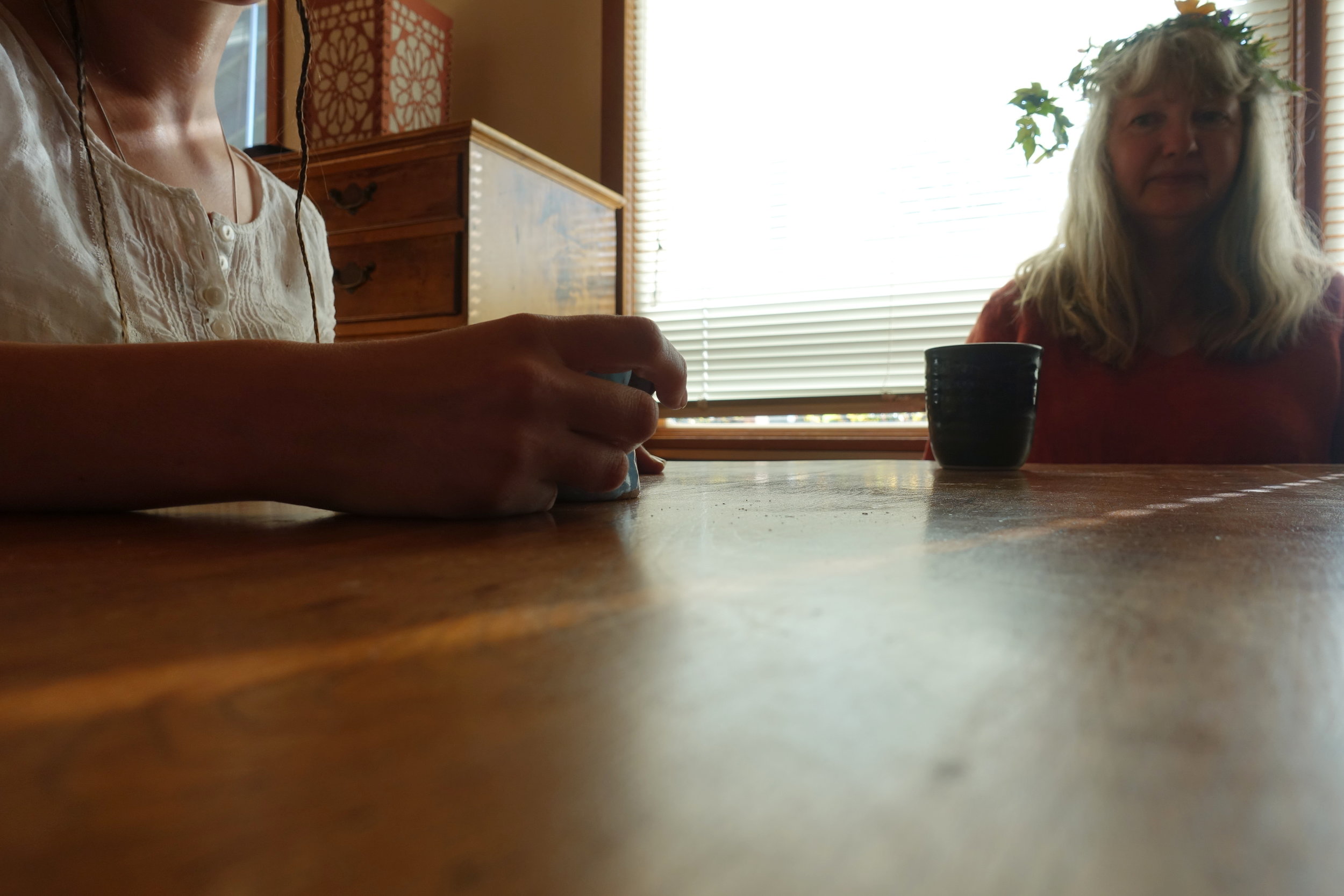I first discovered William Stafford through his work as an Oregon poet. His poem Traveling Through the Dark is probably his most well-known piece and justly so:
Traveling through the dark I found a deer
dead on the edge of the Wilson River road.
It is usually best to roll them into the canyon:that road is narrow;
to swerve might make more dead. By glow of the tail-light I stumbled back of the car
and stood by the heap, a doe, a recent killing;she had stiffened already, almost cold.
I dragged her off; she was large in the belly. My fingers touching her side brought me the reason—her side was warm; her fawn lay there waiting,alive, still, never to be born.
Beside that mountain road I hesitated. The car aimed ahead its lowered parking lights;under the hood purred the steady engine.
I stood in the glare of the warm exhaust turning red;around our group I could hear the wilderness listen. I thought hard for us all—my only swerving—,
then pushed her over the edge into the river.
His poetry contained an accessibility, intelligence, and gentleness that resonated with me. Later, I learned that his writing had been developed and honed as a young Conscientious Objector interned at Camp Belden (California) during WWII. This helped explained the strange camaraderie I felt with him, as I consider myself a pacifist of sorts. "He believed in the fragile but essential community of the world, and he wrote on behalf of what he called "the unknown good in our enemies," writes his son, Kim. At the heart of Stafford's work lies what I hope my own work gives witness to: a commitment to wholeness and to the dignity and humanity of every person.
(Side note: I included a Conscientious Objector character in my first novel in honor of Stafford.)
After he was released from the camps, Stafford went on to teach at universities and write poetry the rest of his life. Though he was well-respected, and well-known (he was the Poet Laureate of Oregon for 15 years), he refused to be pretentious. He wrote for himself, and his vision of the way the world could be, but he carried no hubris when it came to publishing:
"I have genuinely felt throughout my life a sense that any acceptance of what I write is a bonus, a gift from other people....I've always felt the editor's role is to get the best possible material for the readers...not to serve the writer...So I never have felt that I needed to push this stuff into the world. If it's invited in, then it will come."
In art, as in many fields, it is rare to come across such humility, such self-contained awareness, and it speaks to a deep part of me as a writer. It is vital that I believe in the work I do, that I push myself to the limits of excellence as much as I am able, but then, to let it go, to believe that it will find its place in the world without my desperate striving or need for validation. Stafford embodied this posture and I read over his work frequently to remind myself it is possible.
He has contributed so much to the formation of my own writing, it would be difficult to record it all in this post. His meticulous habit of daily writing; his belief that you create good writing by living a life that enables good writing to come about; his refusal to be dismissed as simplistic or sentimental by people who didn't understand his motivations; his ability to be at home within himself and in the world; his rejection of cynicism, all touch me deeply.
About the latter, Stafford says:
"Certain writers create a zone of language that deliberately offends but stays within its own invidious conventions. Challenging genteel culture, these people attain a swagger, in effect saying like a child, "Look at me, I am being bad."Indulging in this kind of affront could be temporarily interesting, but relying on it for a main accomplishment becomes tiresome and petty. And to live by it is to narrow one's ambitions, is to forsake a host of more satisfying accomplishments.These writers reveal an obsession about gentility. Most of us are not permanently shocked enough to be amused for long, but apparently these dabblers in making mud pies can derive a lifelong charge out of defying something they profess not to believe in. Further, if they can maintain their pose of being bad, they can ascribe any negative assessments of their accomplishment to the narrowness of their audience, and thus avoid being judged on the adequacy of their vision, liveliness of invention, depth of realization, flexibility of language, or other such criteria.Gaining attention as they do is as cheap as attempting such by bribery, advertising, demagoguery or any other false means. Timid critics help by not wanting to appear squeamish; they give attention to what is outlandish and fail to remark the shallowness of such attainment that lives by being bizarre."
In my work, writing novels and stories, I often wonder where I fit into the publishing world. I dislike naivete in writing, I abhor moralism and sentimentality, and yet I find I naturally write of goodness that rises out of darkness, of redemption, healing, love that endures. Is there a place for my work in a cynical world that seems to hunger mostly for the kind of realism that shatters hope rather than guards it? I don't know yet, but Stafford holds a lantern for me:
"What if we could all hold in mind the same good dream? That is what a literary work accomplishes momentarily...The myth I hold is not that of the curse on the family, the guilt hovering forever as a result of a bad deed; but instead the vision of life haunted by some unerasable good deed: a life that can’t lose for long, or at least forever. Not Oedipus doomed, but Aeneas bearing the unshruggable potential for later life - this is the pattern I note."
The pattern I note in Stafford's life: peace-making, humility, optimism, dedication, goodness, vision, and excellence, have impacted me greatly. I'm incredibly thankful that his work was invited into the world and I was allowed to learn from it.
Recommended books:
Ask Me: 100 Essential Poems of William Stafford You Must Revise Your Life*
The Answers Are Inside the Mountains*
Down in My Heart: Peace Witness in War Time
Every War Has Two Losers(There is a 30 minute film related to this book here.)*
Both these books have a rambling, organic style which can be hard to follow, but they are littered with gems. I look through them regularly.
Stafford's son Kim has written a fabulous book on writing as well:The Muses Among Us: Eloquent Listening and Other Pleasures of the Writer's Craft























